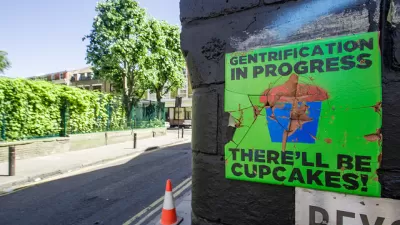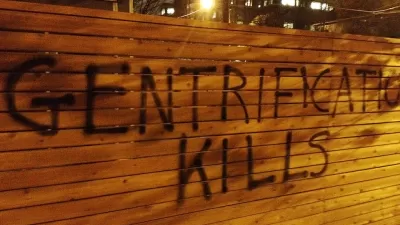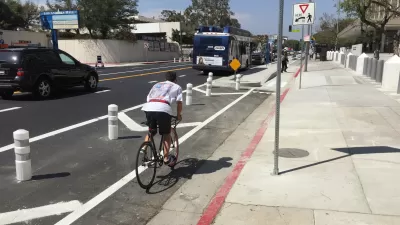My pitches for space usually centered around the developer’s needs and not the needs of the neighborhood or its residents. I didn’t pay much attention to what impact those events would have on the surrounding neighborhoods.
My first foray into creative placemaking entailed teaming up with a friend who managed a local art gallery to organize an art party in one of those empty retail spaces. The commercial real estate agent who represented the owner of that space was my neighbor, and mentioned that he was looking for ways to activate the space to attract potential renters. My friend and I programmed performance artists, video artists, and a band.
A few months later, we organized a similar event in a space down the street that had been a brake service garage. Oil stained the concrete floor and tools still hung on the wall. This time we charged $10 a head and didn’t give away the booze. The brake shop has since been turned into a coffee shop and design studio.
Once I saw that I could make a living producing art events, despite the significant decrease in salary, I quit my law job and started organizing arts events in raw spaces all over the city. I cultivated relationships with developers who would let me temporarily occupy their buildings, which were usually located in less developed parts of the city.
My pitches for space usually centered around the developer’s needs and not the needs of the neighborhood or its residents. I didn’t pay much attention to what impact those events would have on the surrounding neighborhoods. I believed that the neighborhoods would be improved if I could convince people to come visit neglected sections of the city and see their potential.
FULL STORY: Regrets of an Accidental Placemaker

Alabama: Trump Terminates Settlements for Black Communities Harmed By Raw Sewage
Trump deemed the landmark civil rights agreement “illegal DEI and environmental justice policy.”

Study: Maui’s Plan to Convert Vacation Rentals to Long-Term Housing Could Cause Nearly $1 Billion Economic Loss
The plan would reduce visitor accommodation by 25% resulting in 1,900 jobs lost.

Planetizen Federal Action Tracker
A weekly monitor of how Trump’s orders and actions are impacting planners and planning in America.

Waymo Gets Permission to Map SF’s Market Street
If allowed to operate on the traffic-restricted street, Waymo’s autonomous taxis would have a leg up over ride-hailing competitors — and counter the city’s efforts to grow bike and pedestrian on the thoroughfare.

Parklet Symposium Highlights the Success of Shared Spaces
Parklets got a boost during the Covid-19 pandemic, when the concept was translated to outdoor dining programs that offered restaurants a lifeline during the shutdown.

Federal Homelessness Agency Places Entire Staff on Leave
The U.S. Interagency Council on Homelessness is the only federal agency dedicated to preventing and ending homelessness.
Urban Design for Planners 1: Software Tools
This six-course series explores essential urban design concepts using open source software and equips planners with the tools they need to participate fully in the urban design process.
Planning for Universal Design
Learn the tools for implementing Universal Design in planning regulations.
Caltrans
Smith Gee Studio
Institute for Housing and Urban Development Studies (IHS)
City of Grandview
Harvard GSD Executive Education
Toledo-Lucas County Plan Commissions
Salt Lake City
NYU Wagner Graduate School of Public Service





























